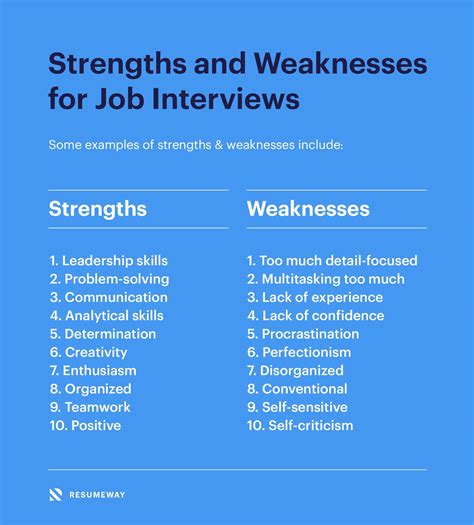Strengths And Weaknesses: How To Answer In English

When it comes to job interviews, one question that is almost always asked is, “What are your strengths and weaknesses?” This question can be tricky to answer, as you want to highlight your positive qualities while also being honest about areas where you may struggle. In this article, we’ll provide you with tips and strategies for how to answer this question effectively in English.
Understanding the Question
Before we dive into how to answer the question, it’s important to understand why interviewers ask it in the first place. The purpose of this question is to get a sense of your self-awareness and how you view your own abilities. By sharing your strengths and weaknesses, you’re giving the interviewer insight into how you might fit into the company culture and what areas you may need support or development in.
The Importance of Self-Awareness
One key factor in answering this question well is having a strong sense of self-awareness. This means being able to identify your own strengths and weaknesses, as well as understanding how they impact your work and interactions with others. If you’re not sure what your strengths and weaknesses are, take some time to reflect on your past experiences and ask for feedback from colleagues or mentors.
How to Answer the Question
Now that you understand the purpose of the question and the importance of self-awareness, let’s dive into how to answer it effectively. Here are some tips:
Highlight Your Strengths
Start by outlining your key strengths and how they relate to the job you’re applying for. Be specific and provide examples of how you’ve demonstrated these strengths in past roles or projects. For example:
- My top strengths include strong communication skills, attention to detail, and the ability to work well under pressure. In my previous role as a project manager, I was responsible for communicating with stakeholders, managing timelines and budgets, and ensuring that every detail was accounted for.
Be Honest About Your Weaknesses
When it comes to weaknesses, it’s important to be honest but also strategic in how you frame them. Avoid mentioning weaknesses that are essential to the job you’re applying for, but also don’t try to spin a strength as a weakness. Instead, focus on areas where you may need improvement but are actively working on. For example:
- One area where I’m currently working to improve is my public speaking skills. While I’ve presented at a few conferences in the past, I still get nervous and would like to feel more confident in this area. To address this, I’ve been taking a public speaking course and practicing with colleagues to get more comfortable.
Show Your Growth Mindset
Another way to frame weaknesses is by showing a growth mindset. This means demonstrating that you’re open to feedback and willing to learn and improve. For example:
- I’ve also realized that I tend to take on too much at once and struggle with prioritizing tasks. While this has led to some stressful situations in the past, I’ve been working on developing my time management skills and have started using tools like to-do lists and project management software to stay organized.
Conclusion
Answering the strengths and weaknesses question effectively requires a combination of self-awareness, honesty, and strategic framing. By following the tips outlined in this article, you can provide a thoughtful and compelling response that demonstrates your suitability for the job.
FAQs
What are some common strengths to mention in an interview?
Some common strengths include strong communication skills, attention to detail, leadership abilities, problem-solving skills, and the ability to work well under pressure.
Should I mention a weakness that is essential to the job?
No, it’s generally not a good idea to mention a weakness that is essential to the job. Instead, focus on areas where you may need improvement but are actively working on.
How can I show a growth mindset when discussing weaknesses?
You can show a growth mindset by demonstrating that you’re open to feedback and willing to learn and improve. Talk about specific steps you’re taking to address your weakness, such as taking a course or using new tools or techniques.
